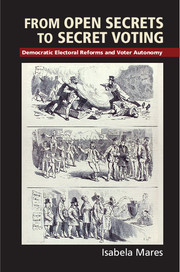Book contents
- Frontmatter
- Contents
- Figures
- Tables
- Acknowledgments
- 1 Introduction
- 2 The Protection of Voters' Autonomy
- 3 Electoral Intimidation by State Employees
- 4 Electoral Intimidation by Employers
- 5 The Production of Irregularities during Elections: A Quantitative Analysis
- 6 The Adoption of Electoral Reforms
- 7 Labor Scarcity, Rural Inequality, and Electoral Reforms: The Determinants of Electoral Reform in the Prussian Electoral System
- 8 Voting for Opposition Candidates: Economic Concentration, Skills, and Political Support for Social Democracy
- 9 Dilemmas on the Right and the Road to Proportional Representation
- 10 From Macro- to Micro-Historical Analysis in Comparative Research
- References
- Index
- Other Books in the Series
1 - Introduction
Published online by Cambridge University Press: 05 July 2015
- Frontmatter
- Contents
- Figures
- Tables
- Acknowledgments
- 1 Introduction
- 2 The Protection of Voters' Autonomy
- 3 Electoral Intimidation by State Employees
- 4 Electoral Intimidation by Employers
- 5 The Production of Irregularities during Elections: A Quantitative Analysis
- 6 The Adoption of Electoral Reforms
- 7 Labor Scarcity, Rural Inequality, and Electoral Reforms: The Determinants of Electoral Reform in the Prussian Electoral System
- 8 Voting for Opposition Candidates: Economic Concentration, Skills, and Political Support for Social Democracy
- 9 Dilemmas on the Right and the Road to Proportional Representation
- 10 From Macro- to Micro-Historical Analysis in Comparative Research
- References
- Index
- Other Books in the Series
Summary
FROM SUFFRAGE EXTENSION TO THE PROTECTION OF VOTERS' AUTONOMY
The process of democratization that unfolded in European countries during the nineteenth century involved multiple dilemmas of institutional design. The first question concerned the scope of political suffrage. The transition from restrictive to extended suffrage took place in different countries either through the adoption of piecemeal changes in the scope of the franchise or through dramatic extensions that enfranchised nearly all citizens. Reforms enacted in Britain exemplify the first approach. There, the expansion of suffrage proceeded gradually. The first Franchise Act, enacted in 1832, extended the scope of suffrage from 5 percent to 7 percent of the population. The second Franchise Act, enacted in 1867, extended the scope of suffrage to 16 percent of the population (Cook 2005: 68). By contrast, both France and Germany adopted electoral reforms expanding the share of the enfranchised population suddenly and dramatically. In Germany, the electoral law adopted in 1870 introduced universal suffrage for men. Similarly, France adopted universal male suffrage in 1799. Although France reverted to censitary voting during the Restoration, it restored full universal suffrage for all male voters in 1848.
A second question on the agenda of democratizing countries concerned the mode of voting. An important dilemma that underpinned electoral reforms throughout the nineteenth century was whether voting should be open or secret. Although secret voting triumphed – an outcome that from the perspective of the twentieth century appears to have been inevitable – its adoption was by no means unambiguous (Buchstein 2000). What is remarkable about nineteenth-century deliberations concerning the adoption of the secret ballot is that significant theoretical and practical ambiguity existed as to whether secret voting provided better protection for voters against intimidation than open voting would. Both methods of voting had prominent defenders at the time, and the political coalitions favoring either secret or open voting were extremely heterogeneous. Opponents of the secret ballot included successors of the Jacobins; conservatives, like Lord Russell and Otto von Bismarck; Catholics, such as Ludwig Windthorst; and liberals, such as John Stuart Mill (Buchstein 2000).
- Type
- Chapter
- Information
- From Open Secrets to Secret VotingDemocratic Electoral Reforms and Voter Autonomy, pp. 1 - 13Publisher: Cambridge University PressPrint publication year: 2015



